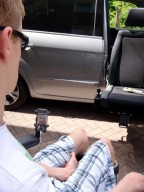A Computing student from Bournemouth University has developed a new smartphone application that will help wheelchair users get into their vehicles more easily.
Paul Whittington has developed the SmartATRS app, which uses smartphones and wireless technology to control the platform lift, automated tailgate and motorised driver’s seat in specially adapted vehicles.
The app has been developed for use with the Automated Transport and Retrieval System (ATRS), which enables a powered wheelchair to independently dock onto a platform lift in the rear of a vehicle.
Paul, who uses a wheelchair, said the app removes the need for the key fobs currently used to control the process.
He said: “For a person with reduced finger dexterity, the small wireless remote control key fobs used to control the platform lift, automated tailgate and driver’s seat are difficult to operate and could deter potential purchasers.
“As I use ATRS for my independence, my experience identified the need to improve the usability for a disabled user, in particular the small wireless key fobs which I found difficult to use.”
He added that the new app can also be used to control items including automated gates, garage doors and front doors, to make it easier for wheelchair users to get from their vehicles into their homes.
Voice control and joystick control have also been applied so that users with reduced finger dexterity can still use the app, which also has a number of safety features – including an emergency stop button.

Paul using the SmartATRS app
Paul worked on the smartphone app for around five months as his final year university project, and said that he had received good feedback.
“I’m very pleased with the final result because SmartATRS has considerably improved the usability of ATRS both for me and potentially other disabled users,” he said.
“SmartATRS is significantly quicker and more reliable than using the small wireless key fobs – especially now that I can control the smartphone using the joystick on my powered wheelchair.”
Paul, 22 of Broadstone, has just finished his degree in BSc (Hons) Computing, receiving a First Class Honours.
He is now planning to undertake a PhD at BU, researching Human Computer Interaction and continuing the work of his final year project.
He also hopes to present his app to the UK manufacturers of ATRS systems, with plans to modify and commercialise it.
He said: “Overall, I found creating SmartATRS challenging and rewarding.
“It provided me with a great sense of achievement knowing that the lifestyle and independence of a disabled user had been further improved by a Human Computer Interaction design specifically targeted to overcome the difficulties of the user.”
 Bournemouth University
Bournemouth University